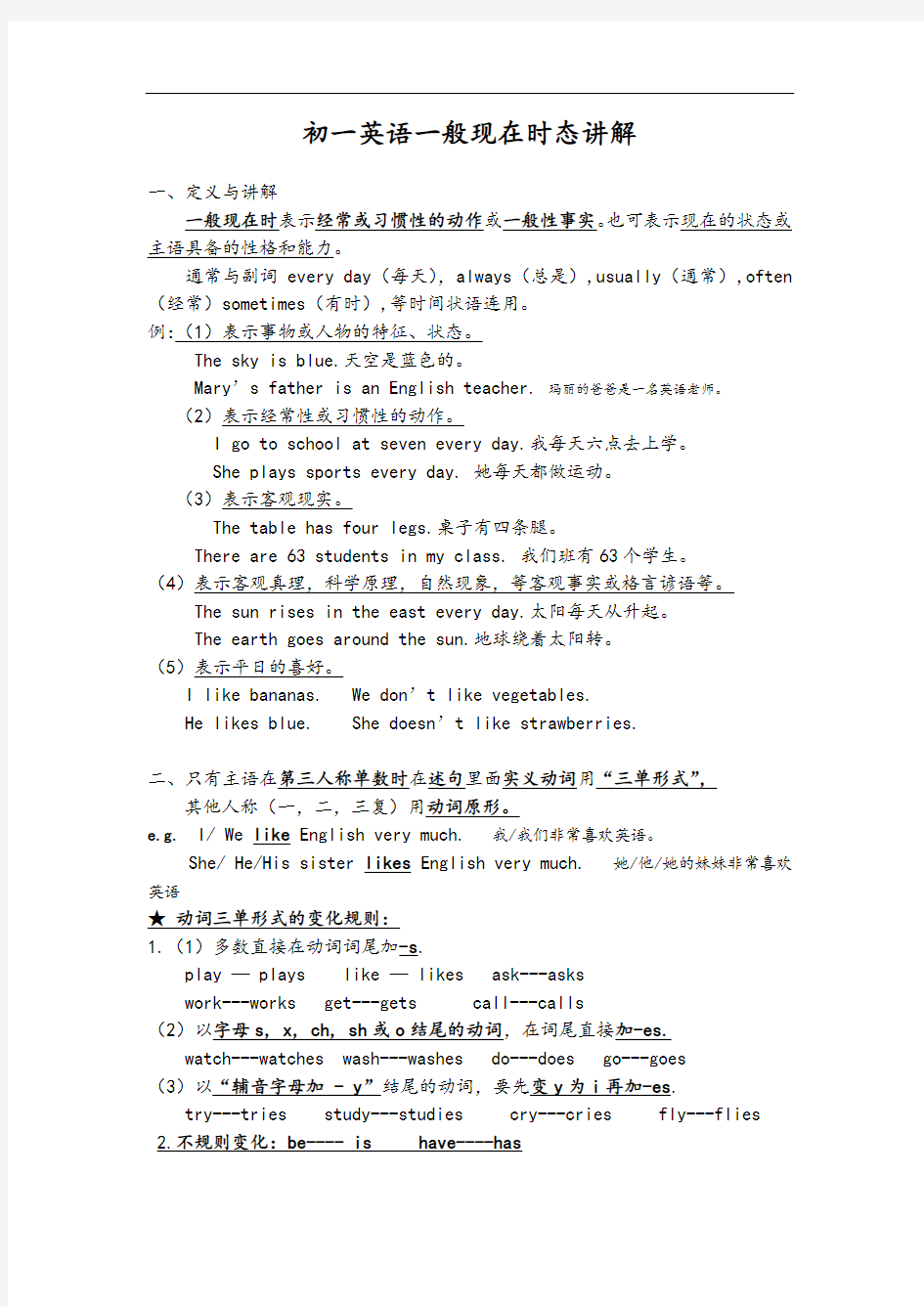

初一英语一般现在时态讲解
一、定义与讲解
一般现在时表示经常或习惯性的动作或一般性事实。也可表示现在的状态或主语具备的性格和能力。
通常与副词every day(每天),always(总是),usually(通常),often (经常)sometimes(有时),等时间状语连用。
例:(1)表示事物或人物的特征、状态。
The sky is blue.天空是蓝色的。
Mary’s father is an English teacher. 玛丽的爸爸是一名英语老师。
(2)表示经常性或习惯性的动作。
I go to school at seven every day.我每天六点去上学。
She plays sports every day. 她每天都做运动。
(3)表示客观现实。
The table has four legs.桌子有四条腿。
There are 63 students in my class. 我们班有63个学生。
(4)表示客观真理,科学原理,自然现象,等客观事实或格言谚语等。
The sun rises in the east every day.太阳每天从升起。
The earth goes around the sun.地球绕着太阳转。
(5)表示平日的喜好。
I like bananas. We don’t like vegetables.
He likes blue. She doesn’t like strawberries.
二、只有主语在第三人称单数时在述句里面实义动词用“三单形式”,
其他人称(一,二,三复)用动词原形。
e.g. I/ We like English very much.我/我们非常喜欢英语。
She/ He/His sister likes English very much. 她/他/她的妹妹非常喜欢英语
★动词三单形式的变化规则:
1.(1)多数直接在动词词尾加-s.
play — plays like — likes ask---asks
work---works get---gets call---calls
(2)以字母s, x, ch, sh或o结尾的动词,在词尾直接加-es.
watch---watches wash---washes do---does go---goes (3)以“辅音字母加 - y”结尾的动词,要先变y为i再加-es.
try---tries study---studies cry---cries fly---flies 2.不规则变化:be---- is have----has
一般现在时态肯定句式:分为含有be动词和实义动词的两种情况:
一.含有be动词的一般现在时的句式:
肯定句式:主语+be+表语( n./adj.等)
e.g. ①He is a worker. 他是个老师
②You are nine. 你9岁。
③T hey are in the classroom. 他们在教室里面
含有be动词一般现在时态的句子转换:
(1)变一般疑问句:当句子中有be动词或情态动词时,则把be动词或情态动词(can,must等)提到句子的最前面,句末改问号。
(口诀:变疑问并不难,be/情态动词提最前);
一般疑问句句式:Be+主语+表语?
e.g. ①He is a teacher. 他是个老师。
一般疑问句→Is he a teacher? 他是个老师吗?
Yes, he is./No, he isn’t. 是的,他是。/不,他不是。
②I am eight . 我8岁。
一般疑问句→ Are you eight? 你8岁了吗?
Yes,I am./No, I’m not. 是的,我是/ 不,不是。
③They are in the classroom. 他们在教师里面。
一般疑问句→Are they in the classroom? 他们在教室里面吗?
Yes, they are./ No, they aren’t. 是的,他们在/ 不,他们不在。
4)I can play soccer. 我会踢足球。
一般疑问句→ Can you play soccer? 你会踢足球吗?
Yes,I can./ No, I can’t. 是的,我会/ 不,我不会。(2)变否定句:在be动词或情态动词后面直接加not变成否定句.
(口诀:变否定最容易,not紧紧跟着be/情态动词)
否定句句式:主语+be+ not+表语:
例:① She is my sister.. 她是我的妹妹。
否定句→ She is not my sister. 她不是我的妹妹。
②I can play soccer. 我会踢足球。
否定句→ I can not /can’t play soccer. 我不会踢足球。
③The students and their teacher are here. 学生和他们的老师都在这儿。
否定句→The students and their teacher aren’t here.学生和他们的老师都不在这儿。
★注意:对一般疑问句的回答:
一般用什么问就用什么来回答。
例: Is she your friend? 她是你的朋友吗?
Yes, she is./ No, she isn’t. 是的,她是/ 不,她不是。
但以下例外:Is this a pencil? Yes , it is./ No, it isn’t.
Is that your backpack? Yes , it is./ No, it isn’t.
Are these your parents? Yes, they are./ No, they aren’t.
Are those Jim’s brothers? Yes, they are./ No, they aren’t.
二.当句子中没有be动词和情态动词,只含有实义动词时,句式如下:
(1)肯定句:
主语(I/We/You/They/…)+实义动词+其他
e.g. I know the girl. 我认识那个女孩。
They always ask the teacher questions. 他们总是问老师问题。
主语(He/She/It/…)+实义动词三单形式+其他
e.g. Lucy plays sports every day. 露西每天都要运动。
He watches TV every evening. 他每天晚上都看电视。
(2)一般疑问句:
变一般疑问句时,在主语前加助动词do或者does来变成一般疑问句;
¤当句子主语是I, we, you,以及复数…时,句首加 do 。
¤当句子主语是第三人称单数she,he,it..等时,句首加 does 。
注意:加了助动词does, 这时谓语动词要还原(用动词原形);另外,句子末尾用问号。
A. 主语是I/we/you/they/…等时:
疑问句式: Do+主语+动词原形+其他?
e.g. ① I have two sisters and a brother.
一般疑问句→Do you have two sisters and a brother.?
Yes, I do./ No, I don’t.
e.g. ②The boys play soccer every day.
一般疑问句→Do the boys play soccer every day?
Yes, they do./ No, they don’t.
B. 主语是he/she/it/…等三单时:
疑问句式: Does+主语+动词原形+其他?
e.g. ① He/Mike/ My brother likes black schoolbags. 他/迈克/我的哥哥喜欢黑色的书包。
→Does he/Mike/ your brother like black schoolbags? 他/迈克/我的哥哥喜欢黑色的书包吗?
Yes, he does./ No, he doesn’t. 是的,他喜欢 / 不,他不喜欢。
②She/ Gina / Our English teacher goes to school by bus. 她/吉娜/我们的英语老师坐公共汽车去学校。
→Does she/ Gina/ your English teacher go to school by bus? 她/吉娜/我们的英语老师坐公共汽车去学校吗?
Yes, she does./ No, she doesn’t. 是的,她是/ 不,她不是。(3)否定句:
变否定句时,在主语后谓语动词前加助动词don’t或者doesn’t变成否定句,切记:助动词后的动词还原成动词原形。
¤当句子主语是I, we, you,以及复数时,加don’t构成否定句。
¤当句子主语是第三人称单数she,he,it等时,加doesn’t构成否定句。
e.g①述句:We go to school at 7:00 every morning. 我每天早上7点去上学
否定句→We don’t go to school at 7:00 every morning. 我每天不是7点去上学
②述句:She has a brother. 她有个哥哥。
否定句→ She doesn’t have a brother. 她没有哥哥。
※在一般现在时中,当主语是第三人称单数时,谓语动词要用第三人称单数形式,即常在动词原形后加-s/-es/变y为i+es.(注意:只在肯定句/述句里面动词用三单形式,在其它所有句型里动词都用原形)。
但有些同学们对于哪些主语是第三人称单数还不十分清楚,
现归纳总结如下:
一、人称代词he, she, it是第三人称单数。如:
He likes watching TV. 他喜欢看电视。
She has lunch at twelve. 她十二点吃午餐。
二、单个人名、地名或称呼作主语;是第三人称单数。如:
①Han Mei likes salsd . 梅喜欢萨拉。
②Beijing is in China. 在中国。
③Uncle Wang often plays volleyball.. 王叔叔经常打排球。
三、单数可数名词或"this / that / the+单数可数名词"作主语时,是第三人称单数。如:
②This book is yours. 这本书是你的。
③That car is red.
④The cat is Lucy's. 这只猫是露茜的。
四、不定代词someone, somebody, nobody, everything, something等及指示代词this, that作主语时,是第三人称单数。①Everyone is here. 大家到齐了。
②There is a watch on the table. 桌上有块手表。
③This is a pen. 这是一支钢笔。④That is an eraser.
五、不可数名词作主语时为第三人称单数。如:
①The milk(牛奶) is in the glass. 牛奶在玻璃杯里。
②The bread is very small. 那面包很小。
六、当数字或字母作主语时,看作第三人称单数。如:
①"6" is a lucky number. "6"是个吉利数字。
②"I" is a letter. "I"是个字母。
巩固练习题:
一.用Be动词填空。
be动词口诀:I 用am, you 用 are, is连着 he /she /it,
单数名词用is,复数名词都用are
1. Are you __ Li Fen ? No, I __ not .
2. ________ Mr. Green very good ? Yes , he __ .
3..These books __ very interesting .
4. What class ____ you in ?
5. You and I __ good friends .
6. The basketball club ___ fun .
二. 写出下列动词的第三人称单数形式。
have like drink _____ go _____ stay ______ make______ look______ have_____ come______ watch______
ask _____ fly _______ do______ study_____ teach_______
sound______ let _______ wash _______ carry ______ play_______
三.用所给动词的适当形式填空。
1.I _________(have) two sisters and my mother _________(have) only one
brother.
2.Miss Xie ________(have ) a brown bag and two red jackets.
3.We _________ (like) our English teacher.
4.Tom ___________ ( go) to school at 7’o clock.
5.Li Song _________(watch) TV at home.
6.You and I__________ (play ) volleyball every day.
7.That __________( sound) interesting.
8.My father __________ (let) me get the baseball bats.
9.Those girls __________(ask) the teacher for it.
10.Aunt Jenny _________(do) housework(家务) every day.
三.按照要求改写句子
1.This is my pencil ?(变一般疑问句) your pencil ? Yes, ____
_____.
2. These red hats are Kate’s .(一般疑问句) hats Kate’s ? No,
____ _____.
3. Mary hasbooks . (变一般疑问句) Mary ________ books ?
4. She likes the black bag very much . (变一般疑问句)
she the black bag very much? No, she ________.
5. I like apples. (变一般疑问句) you apples ?
6. It’s an English dictionary . (变一般疑问句)
English dictionary?
7. He has a computer and a modile plane . (变一般疑问句)
he a computer and a modile plane? Yes, he ________
四、按照要求改写句子
1. She is a good student. ( 改为否定句)
She _________ a ___________student.
2. We play tennis every day. ( 改为否定句)
We_________ __________ ________ every day.
3. The students like the teacher . (改为否定句)
The students _________ _______ the teacher.
4. Simon and Daniel have a ping-pong bat .(改为否定句)
Simon and Daniel __________ __________ a ping-pong bat
5. She has some white baseballs . ( 改为否定句)
She ________ _______ any white baseballs
6. Miss Xie teaches us Chinese. ( 改为否定句)